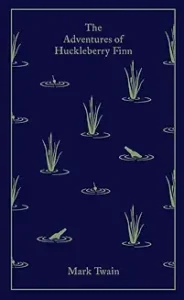The Adventures of Huckleberry Finn by Mark Twain 1884
Sometimes credited with being the Great American Novel and sometimes attacked as racist, Twain’s book remains one of the classics of American fiction.
I had read this book somewhere along the line in high school and then again 12 years ago, but I was not prepared for the humor, the humanity, and the cleverness of the novel. Twain created memorable characters in Huck, Jim, Tom Sawyer, and the Duke and the Dauphin and wove them together into an adventure tale that presented the cruelty and inhumanity of slavery alongside the growth of humanity in one young boy. For every ‘nigger’ spouting Southern bigot, there was a kind and gentle soul, but it was only Huck Finn on his raft with the escaped slave, Jim, who comes face to face with the choice of following society’s dictates and turning Jim in or seeing him as a person and helping him flee.
The book is full of crazy antics as Huck and Jim sail down the Mississippi on their raft with its tepee, fishing lines, and canoe. The Duke and Dauphin are classic charlatans out to fleece the rubes in the river side towns. Aunt Sally and Uncle Silas are innocents who mistake Huck for Tom and Tom for Huck. Perhaps the best character of all next to Jim is Tom Sawyer whose demand that they conduct Jim’s ‘evasion’ with classic care is over-the-top funny.
The book ends happily as Jim has been freed by the widow Watson in her will; Huck and Tom are embraced by their family despite their crazy antics; the Duke and Dauphin are ridden out of town after being tarred and feathered. Life goes on even as Huck grows up. Did Twain intend this as humor, satire, or a deep dive into the human side of slavery for both the enslaved and the slaver? Is Huck’s decision to break the law to protect Jim the core of the story or an interesting sidelight? Critics have debated these questions for decades and Percival Everett in his new novel “James” gets to the heart of these questions by re-imagining Twain’s story from Jim or James’ standpoint. Worth reading both books.



